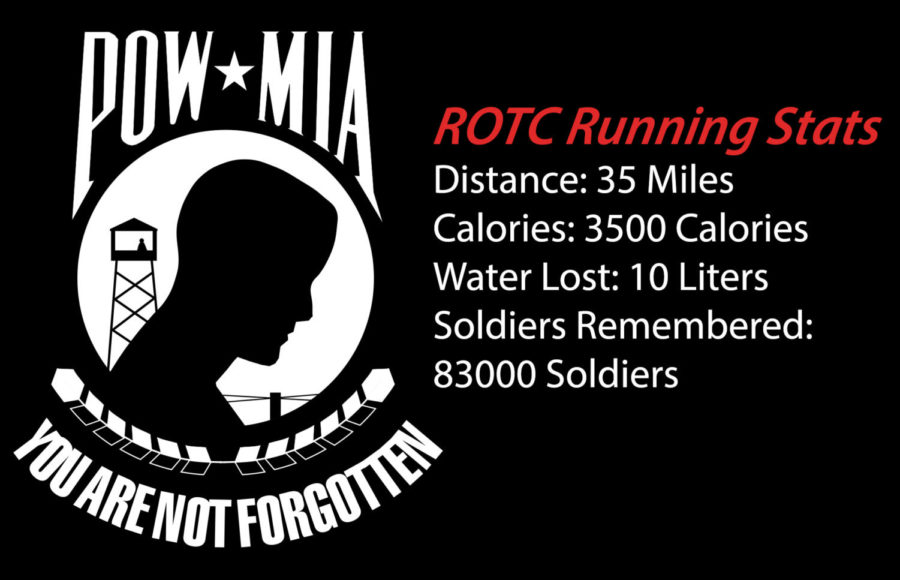Cadets run to remind others to never forget
Katy Klopfenstein and Ben Holmes/Iowa State Daily
POWMIA infographic
September 20, 2015
Thirty-five miles is a daunting run, but when it comes to showing respect for those who have never come back from war, running 35 miles was the least the ISU Air Force ROTC (AFROTC) could do.
About 30 ISU AFROTC cadets ran from Des Moines to Ames on Friday to commemorate and mourn years of servicemen and women who never returned from their call of duty, along with those who came home as scarred survivors.
About POW/MIA day
Prisoner of War/Missing in Action (POW/MIA) Day is a national observance day not associated with any particular war to honor all of the returned POWs and all of the Americans who are either missing or unaccounted for.
“With hearts full of love, families carry on with an unfillable void, and we stand beside them — one and all — acutely aware of the cost at which our liberty comes,” President Barack Obama said in the annual POW/MIA Recognition Day proclamation this year. “Today and every day, let us renew our pledge to never stop working to bring home the ones they love to the land they risked everything to protect.”
POWs and MIAs were not commemorated for their service to this country until 1979. The National League of Families proposed in 1985 that the third Friday of every September become a commemoration date.
The Run
Veterans and cadets met in Des Moines at 9 a.m. to hear Lt. Gov. Kim Reynolds deliver and sign a proclamation honoring POW and MIA veterans.
Cadet Tom Berland, who ran for the second year in a row, said that it acted as a reminder as to why they were running.
The cadets began their journey after Reynolds’ speech.
They were singing Jodies, a military cadence call, and running along the highway, when they were joined by a police escort for their run. As they worked to keep a good pace, the cadets, when tired, could hop in the van that drove next to them, get some water, something to eat and rest their legs before they hit the pavement again.
Ryun Hobbs, cadet and senior in aerospace engineering, said that as long as two cadets are running at the same time, the run is still in progress.
Hobbs’ goal that morning was to run the entire 35 miles between Des Moines and Ames. He had attempted to make the trek last year, but was cut short by a few miles.
“Each year there is usually someone or two people who try to do the whole thing,” Hobbs said. “It’s just a challenge and it’s a good cause.”
Hobbs, who wants to do combat rescue throughout his military career, said these kinds of runs are good preparation for what he plans to do in the future.
Cadets usually divide the run into two shifts, one in the morning and the other in the afternoon. Each run averages about 17 miles.
Berland talked about the great morale that the cadets created and how he personally enjoyed the police escort.
Berland and Hobbs both said they kept a better pace than previous years and made a better time. Hobbs estimated they ran about 18 miles.
Before the afternoon shift got its chance to run, it started to rain and lightning. Although the cadets will run in rain or shine, they will not run in lighting. The afternoon run was canceled.
The cadets who ran that morning, along with those who were set to run that afternoon, met at 1 p.m. in the Gold Star Hall of the Memorial Union.
Gold Star Hall
Cadet Conner Tillo stood with his hands to side, his posture perfectly straight, and the names of fallen ISU alum decorated his surroundings.
A single candle was lit next to him on the white, round table. One rose leaning toward the doors leading out of the Memorial Union. Behind the candle was a plate with a slice of lemon and silverware with a wine glass turned upside down. An empty chair was at the table with the POW/MIA flag laid across it. All of these tokens have different meanings to remember the fallen.
Cadets volunteered to stand guard in the Gold Star Hall from 8 a.m. until the end of the run. A simple sacrifice of their day was made to help others remember and honor those who made sacrifices involving their lives.
“It’s for the millions of people who have died,” Tillo said. “A lot of people don’t know what it represents. But this room is an honor. This building is an honor.”
A sheet of paper on the table described what the items represented, which gave students an opportunity to learn about the day.
The AFROTC cadets stood in a three-row formation at the end of the day and waited for McTernan to make his speech, a final recognition for the fallen.
As students walked through the hall, some removed their hats while others shook the hands of the cadets.
McTernan began his speech by stating facts about POWs and MIAs. He outlined the day’s activities and the importance of this annual event.
“We should always remember,” McTernan said.
“Never forget,” the cadets said in unison.
The ceremony ended with the change of guard. As the new guard walked to the second star in the hall, he saluted the names of the fallen, saluted the guard whose shift he was taking over and switched rifles while students and cadets alike watched solemnly from afar.
“[McTernan’s] speech and the proclamation in Des Moines, that’s the reason we’re doing this,” Berland said.

















